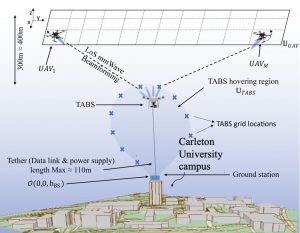Notice:
This event occurs in the past.
Science Café | 5G Drone Cellular Communications: Research and Challenges
Wednesday, April 12, 2023 from 2:00 pm to 3:00 pm
- None event

Drones are envisioned to be one of the main components of 5G or 6G cellular networks. Their ability in accomplishing diverse missions such as surveillance, cargo delivery, geographical mapping, remote sensing, and disaster management has increased demands for the use of drones in various domains, dramatically. Apart from drones’ benefits, their effective deployment entailed addressing some technical challenges such as connectivity, channel modeling, uplink/downlink interference, 3D coverage and power optimization. Hence, addressing such challenges is critical to promote practical usage of the cellular-connected drones in future wireless networks. Our works focus on solving the connectivity and interference problems in 5G cellular drone communications using learning approaches.
ABOUT THE PRESENTERS

Fatemeh Banaeizadeh, PhD Candidate, School of Computer Science, Carleton University
Fatemeh Banaeizadeh is currently pursuing doctoral studies on applying Machine Learning approaches to 5G and Drone navigation, under Professor Evangelos Kranakis, Professor Michel Barbeau and Professor. Joaquin Garcia-Alfaro. Fatemeh’s research interests are in Wireless Communication, 5G, Unmanned Aerial Vehicles (UAVs), and Machine Learning, and she has been a MITACS Global Research and Ericsson intern since 2020.
Find Fatemeh on LinkedIn here.

Pravallika Katragunta, PhD Candidate, School of Computer Science, Carleton University
Pravallika Katragunta is currently pursuing a PhD in computer science at Carleton University under the supervision of Professor Michel Barbeau, Professor Evangelos Kranakis and Professor Joaquin Garcia-Alfaro. Pravallika’s area of research interests are Wireless communications, drones, Machine learning and causal inference. She is working on location optimization of TABS while serving high altitudes drones using learning approaches, and has been a MITACS Global Research and Ericsson intern since 2020.
Find Pravallika on LinkedIn here.